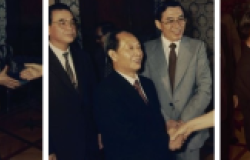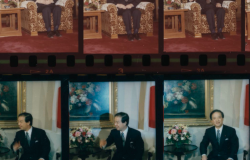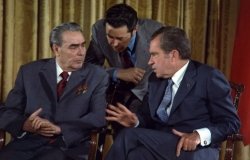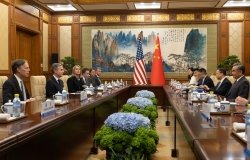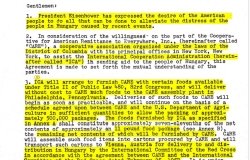NKIDP e-Dossier No. 5 on Pueblo Incident Featured in South Korean Press
Recently released NKIDP e-Dossier No. 5, "New Romanian Evidence on the Blue House Raid and the USS Pueblo Incident," was reported on widely by the South Korean press.
Recently released NKIDP e-Dossier No. 5, "New Romanian Evidence on the Blue House Raid and the USS Pueblo Incident," was reported on widely by the South Korean press, including SBS, Dong-A Ilbo, Segye News, and Hankook Ilbo.
Various reports in the South Korean media showcased the value of the Romanian documents on the 1968 USS Pueblo Incident and the Blue House Raid obtained by NKIDP, materials which reveal that North Korea's behavior was dismissed by the Soviet Union but welcomed by the Communist Party of China. Professors Mitchell Lerner and Jongdae Shin, who wrote introductions for the 28 Romanian documents included in NKIDP e-Dossier No. 5, were interviewed by South Korean reporters.
Links to and summaries of the Korean language reports are included below:
The Cause of the “Pueblo Crisis” (SBS)
Documents uncovered by NKIDP provide new evidence on North Korea’s motives for capturing the US Intelligence vessel USS Pueblo. Archival sources from Romania note the rapid change in Chinese attitude towards North Korea following the incident. This observation has led Professor Shin Jongdae to hypothesize that Pyongyang intended to increase tensions to move closer to Beijing.
North intended to restore bad relations with China through the “Pueblo Crisis” (Donga News)
There have been assertions that the Pueblo Crisis and the Blue House Raid in 1968 were ploys to strengthen the central authority in Pyongyang; however, new documents uncovered by NKIDP from Romanian state archives reveal how North Korea sought to open a “second front” against the US in the Korean Peninsula to move closer to the PRC.
Soviets and the Communist World criticized the 1968 provocations (Donga News)
Newly uncovered documents on the Pueblo Crisis show how the Soviet Union was extremely critical of North Korean actions. In fact, the sources show that the Pueblo Crisis created a huge rift between the Soviets and the North Koreans.
North’s raid on Blue House, a show for Sino-DPRK relations (Segye News)
Using newly uncovered documents from Romania, NKIDP provides evidence of North Korea’s attempt to mend ties with the PRC by cooperating with Beijing’s vision of a two-front war in East Asia. In addition, the Romanian sources reveal how the Soviets did not encourage or support the action.
1968 Pueblo Incident intended to restore relations between the North and China (Segye News)
New documents uncovered by NKIDP reveal how the Pueblo Crisis was an attempt by North Korea to restore frayed relations with China. The Romanian sources also suggest that the Blue House Raid was conducted for more of the same reason.
‘The Attitude of China upon North Korea’s Blue House Raid…’ (Hanguk Daily)
NKIDP released newly uncovered documents from Romania that reveals new information about the Pueblo Crisis. In particular, the sources show how the Chinese attitudes towards North Korea rapidly improved following the provocations. This has led some to believe that the tensions were initiated by Pyongyang to improve relations with Beijing.
Related Programs

North Korea International Documentation Project
The North Korea International Documentation Project serves as an informational clearinghouse on North Korea for the scholarly and policymaking communities, disseminating documents on the DPRK from its former communist allies that provide valuable insight into the actions and nature of the North Korean state. It is part of the Wilson Center's History and Public Policy Program. Read more

Hyundai Motor-Korea Foundation Center for Korean History and Public Policy
The Center for Korean History and Public Policy was established in 2015 with the generous support of the Hyundai Motor Company and the Korea Foundation to provide a coherent, long-term platform for improving historical understanding of Korea and informing the public policy debate on the Korean peninsula in the United States and beyond. Read more
